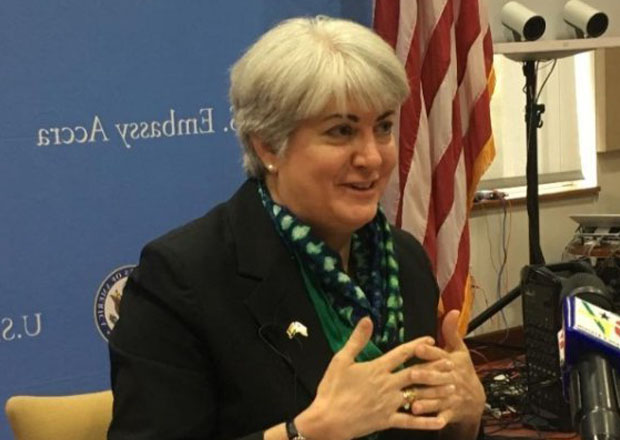American companies thriving in Ghana – Ambassador Sullivan
- Posted on
- Comment

• US envoy courts more investors
American companies which are new to the Ghanaian market must not lose the opportunity to invest in Ghana, the United States Ambassador to Ghana, Stephanie S. Sullivan, has stated.
Addressing the opening session of the U.S.-Ghana Business Forum, the U.S. envoy told participating American companies, “For those who might be new to the Ghanaian market, I say to you: don’t let this opportunity pass.”
“From perfume to pizza, from tweets to flights, U.S. companies are finding what they seek in Ghana: a growing economy, political stability, security, and the enormous promise of the African Continental Free Trade Area,” she noted.
Ambassador Sullivan said American innovators were eager to partner with Ghanaian businesses across a wide range of industries that support their work – from logistics to raw materials and many others.
She disclosed that the US Mission in Accra has a dedicated interagency deal team focused on supporting U.S. companies, helping them to find partners, navigate the regulatory environment and win deals.
“I encourage all interested American firms to seek the support of our Deal Team, made up of the U.S. Commercial Service, the Foreign Agriculture Service, the Trade and Development Agency, the U.S. Agency for International Development, and the State Department’s Economic Section,” she announced.
She was pleased that in spite of the pandemic, several well-known American companies and brands had chosen Ghana as a market for growth.
“Twitter announced in April that it will open its West African headquarters here; the Fareast Mercantile Company recently opened a new Estee Lauder cosmetics store as well as two Domino’s pizza franchise stores in Accra; and in May, United Airlines reopened its direct non-stop route between Washington, DC and Accra. That same United flight delivered more than 1.2 million Moderna COVID-19 vaccines to Ghana last Saturday morning. Along with Delta Airlines’ non-stop from New York, business travellers on both sides of the ocean have direct access to each other’s markets,” she said.
According to Ambassador Sullivan, there are well over 100 U.S. firms operating in Ghana. From the development and exploration of major oil fields by Kosmos Energy to the transformation of healthcare delivery by Zipline, which transports lifesaving medical products and vaccines to remote areas by drone, companies were finding success in Ghana and contributing to prosperity in both countries.
She observed that Ghanaian firms are equally excelling in the U.S. market, where “consumers are benefiting from quality made products made right here in Ghana. For example, Emi-Beth Aku-Quantson is the dynamic owner of Kawa Moka coffee and an alumna of our embassy exchange programmes. She landed a contract with Boston-based 7-11 stores to supply hundreds of well-known convenience stores with Ghanaian-grown coffee. American firm Bunge Loders Croklaan is processing shea butter here in Ghana at a state-of-the-art fractionation facility in Tema, creating jobs locally, and exporting shea products under the African Growth and Opportunity Act (AGOA).
Providing some statistics, the US Ambassador said more than 6,500 goods could be exported duty-free from Ghana to the United States, adding that “last year, Ghana exported almost $136 million in goods to the United States, from mostly Ghanaian companies.”
As Africa’s economy and economies around the globe dust themselves off from the effects of the pandemic, the opportunity is ripe for the African Continental Free Trade Area (AfCFTA) to deliver on its objective to expand intra-regional trade and capture new foreign direct investment – with Ghana in the lead as host of the secretariat. The AfCFTA is a game changer not only for doing business across the continent but also for how the world thinks of Africa. And Ghana is well positioned to capitalise on the new economic synergies and opportunities for growth that AfCFTA can bring to the continent.
That entrepreneurial spirit of working hard, taking advantage of opportunities and finding success is alive and well in Ghana, and it’s a cornerstone of the U.S. – Ghana commercial relationship. Small and large companies alike, starting with an innovative idea, growing and expanding, then seeking partners and customers across the ocean – are what keep our trade relationship so active and vibrant.
Ghana’s Minister for Trade and Industry, Mr Alan Kyerematen prayed for more favourable trade policies in the wake of the change in government in the US.
He called for renewed review of the African Growth and Opportunity Act (AGOA) which is set to expire in 2025.
“It’s my belief that this year’s US-Ghana Business Forum will provide a platform and opportunity for us to deliberate on our future post AGOA US relations,” the Minister said.
By Isaac Aidoo, ACCRA







 (Selorm) |
(Selorm) |  (Nana Kwesi)
(Nana Kwesi)